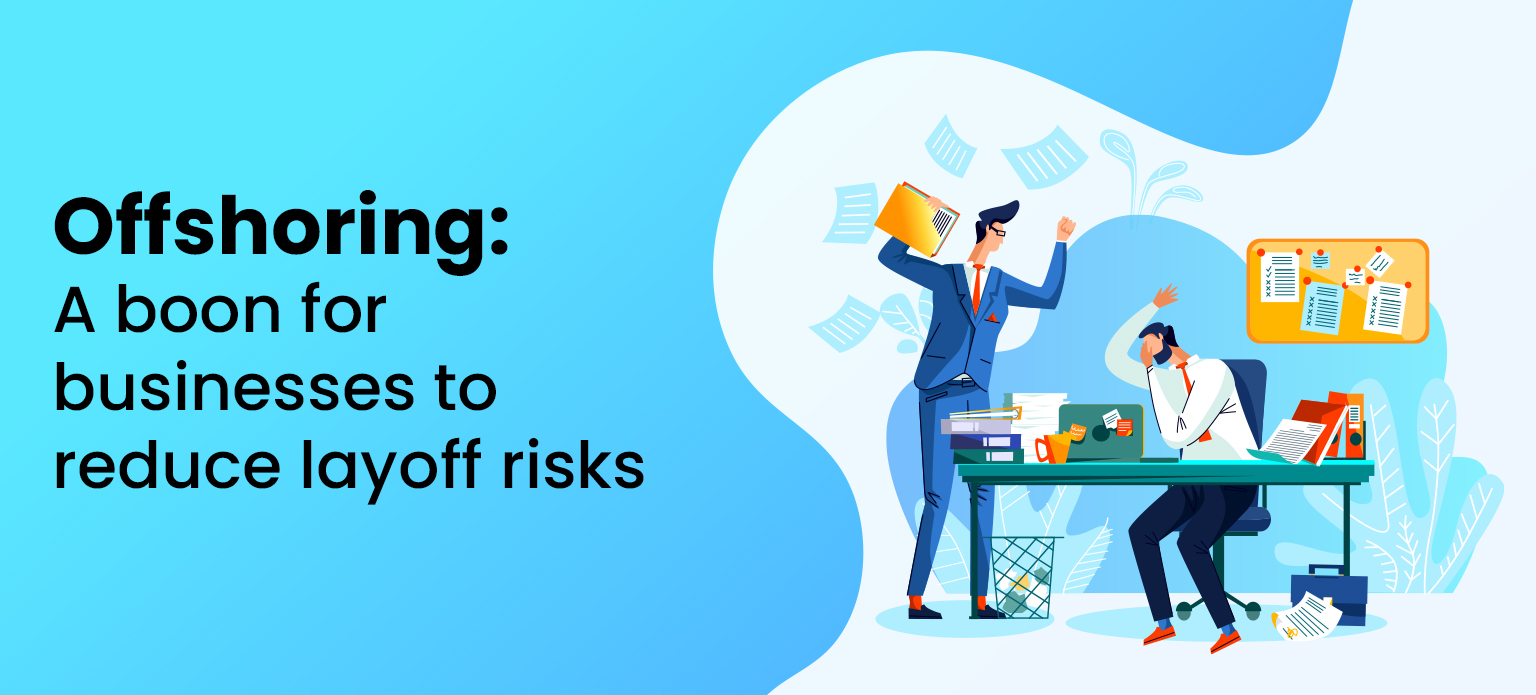For decades, we have witnessed this particular argument on outsourcing. To settle it for once and for all – everything is a bane and a boon. Used with the right resources and strategies, offshoring can help businesses reduce layoff risks, maintain their brand value and contribute to their overall development. The pandemic of COVID-19 passed over us a couple of years ago. But the effects are still lingering. Since then, organisations have adopted a pattern of laying off employees at any sign of economic slowdown or distress. Randstad RiseMart released the data to support how almost all business organisations downsized in 2023. While this is a good cover from the thunder, it has a significant disadvantage in the long run. Companies hold lesser and lesser credibility, accountability or value in the job market. Offshoring defines the way out.
What is Offshoring?
Offshoring is a common business practice for companies wanting to move their functions to other countries. To offshore their operational and service-related functions, companies hire overseas services to gain more scalability, flexibility and efficiency. Not just that statistics support that companies who offshore their tasks see an increase in their production capacities. With more resources in hand, it gives them the time they need to determine the strategies for their business and gain the desired outcomes. Outsourcing manufacturing, recruitment, customer service and accounting are fairly common in all industries. As long as no more than the operational managers are involved in overlooking the offshored process, there is no scope for laying off. Simply because there is no one hired in-house.
The Dominos of Layoff
Low demand leads to higher production costs. Not because the company needs to break it even. Companies struggling to get enough sales have the same number of mouths to feed as the ones who don’t. But brands cannot simply fluctuate their prices as they will. Under those circumstances, layoffs play the best chance in supporting their survival. While it does settle the storm, it doesn’t bode well for their futures.
The hard consequences of laying off are a tainted reputation, losing quality employees and a lower brand image. This would not only avail the media the chance to toss the brand in the air but also dilute its reputation in the job market. The Society for Human Resource Management studied that 62% of human resource and recruitment professionals vouch for these impacts. In effect, the next time the organisation are in conversation with a stakeholder or simply wishes to make new hires, this follows like a shadow. The more frequent the practice of laying off becomes, the darker the shadow gets.
How Does Offshoring Work?
The production and availability of different products and services differ in different countries. Consequently, so does their cost. Companies from one region offshore their operations and functions to another for cost benefits. The rest of the functions within the company run without any disruption. However, they can not save on jobs while also delivering the same quality as with an in-house team. Unlike when outsourcing, there is no selling of an entire unit or division to a third party. Equally important, offshoring usually results in the movement of the production operations to another graphical location.
Other Benefits
Outsourcing is much like the saying – Out of sight, out of mind. With greater availability and accessibility, companies avail their customers the benefit of reaching out to them on their own time. While this is very difficult to attain without offshoring services, it couldn’t get any easier. Notably, offshoring is one of the most common and, hence, fluent practices in business organisations. And the benefit is not just limited to cost-cutting.
Organisations usually outsource processes like manufacturing, customer support, information technology and development. These processes are labour-intensive. Some also required specialisation. When offshored to a different geographical location, the company saves on process costs, labour costs as well as development. Companies have the chance to hire local employees and boost their economy. All while saving themselves from employee management Some foreign countries also have lower tax obligations. Weighing in on various factors, organisations can improve their cash flow. The saved amount could be reinvested in the in-house team and their management or marketing and upscaling the brand. Truth be told, you will still have some money left!
Tips
But is offshoring right for your business? To clarify, offshoring brings a lot of benefits to the companies in need. However, not all companies need to offshore, or outsource their services. To determine if you fall into the category, first, review your needs and goals. Does offshoring match your financial goals? Would it save time? If so, where do you plan on utilising this time instead? Secondly, outline your preliminary plan. What services or tasks are you looking forward to outshore? Where is it best to outshore your services? Map out other factors like the availability of manufacturing space and cheap labour in your chosen location. Uniquely, involve your stakeholders and team members to brainstorm with you. Lastly, strategist against certain odds like time zone differences, communications, instability and potential failure.
Have a query? Reach us out on +44 203 813 7000 or drop an email at info@eximiousglobal.com.



